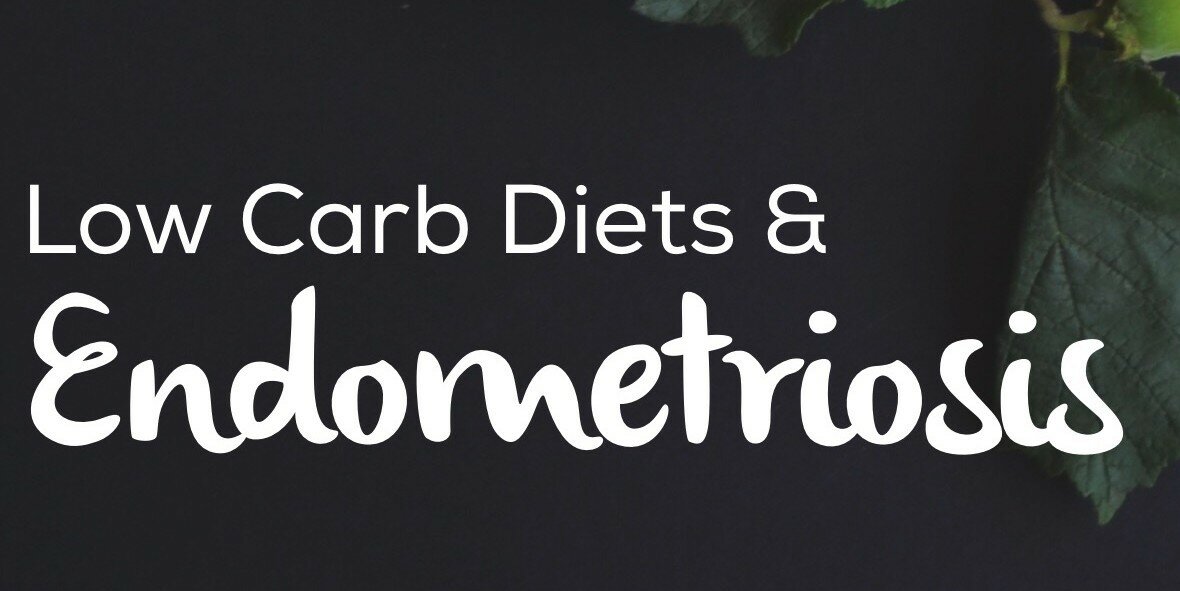This post was half inspired by another instagram question, and half by my own life experience. The other day, another lovely girl inquired about low carb diets and endometriosis, and if I have any experience with this. Fun story – I do. The TL;DR is that a low carb diet is the way to go here. But, I’ll explain below with the actual details…

Most of the articles I’ve found online about endometriosis and diet link the type of diet that is correlated with the existence of endometriosis. Well, that doesn’t help us at all. If you’ve already got endometriosis, you don’t need to know what kind of diet or lifestyle is related to maybe not getting the condition. Even then, if you want to follow that advice to see if a statistically and theoretically preventative diet will help you manage symptoms, the articles tend to focus on things NOT to eat – don’t consume meat, or dairy, or alcohol. Okay, cool.

So, we’re left with a dearth of articles actually focusing on what to eat if you have endometriosis. So, let’s get into it. Spoiler – low carb diets and endometriosis were meant to be.
What is endometriosis?
Just in case you aren’t wholly familiar with this situation, let’s take a look: endometriosis is a condition where the tissue that lines your uterus (the endometrium), grows outside of your uterus. It’s commonly considered to be an auto-immune condition. It’s also important to note that this is the tissue that grows that nice little blood cushion, egg bed every month. So, that same little cushiony egg bed that was totally fine inside of your uterus, now grows outside of it, too.
This contributes to symptoms like lower back pain, severe cramping, heavy periods, fertility issues, often painful bowel movements or IBS, and period pain that is so bad you can become nauseous and dizzy.
Tell me about low carb diets and endometriosis!
So, this article is heavily based on n=1 experimentation. What does that mean? The test pool is one person, and that person is me. I’ll pull in lots of science and some studies, though. Fear not.
I’ve had endometriosis pretty much as long as I can remember. I was put on birth control pills at 16 to deal with such an irregular cycle. They helped to normalize the amount of days, but that’s about it.
I honestly didn’t feel any relief with my period until I started eating low carb, about ten years later. Seriously, ten years later. From my own experience, it was a revelatory change. I felt normal. My symptoms stopped taking over my life. The change has been so drastic that even if there were no other benefits, I would still maintain this lifestyle. It’s that worth it to me.
Why didn’t I title this article “keto and endometriosis?” I thought about it – but, since I’ve experienced the same results on a ketogenic diet, as I have on a low carb (<75g net carbs daily) diet, I thought I’d leave things more open.
Why would a low carb diet help endometriosis?
So, endometriosis is a double whammy of hormone disregulation in the form of excess estrogen and autoimmune issues. We’ve discussed before how low carb diets are actually really beneficial for regulating hormonal issues, and that autoimmune condition symptoms are improved by a low carb diet, but let’s go over the basics one more time:
- grains, gluten, legumes and sugar are all highly inflammatory
- inflammation causes gut permeability issues, and leads to autoimmune disorders
- eliminating these inflammatory compounds can help to seal up your gut, and allow your body to do what it’s supposed to do – heal yourself
- inflammation = swelling and pain, so there’s another argument for eliminating it right there ;)
- sugar consumption leads to excess estrogen via insulin production, in a crazy mechanism explained in this article
“When insulin spikes, typically after a meal high in sugar, this can lead to lower levels of an important protein known as sex hormone binding globulin (SHBG). SHBG binds excess estrogen and testosterone in the blood, but when it’s low, these hormone levels increase. Insulin also increases the production of testosterone, which is then converted into even more estrogen by fat tissue in the belly.” – Dr. Sarika Arora, MD, for Women’s Health Network
Thus, we can see how a low carb diet would help out here. Reducing sugar, grain, gluten and legume intake decreases inflammation and helps with healing our guts. The move away from sugar not only decreases inflammation, but also helps to steady hormone levels, particularly estrogen.
Dietary support for endometriosis
- Liver support – one of the liver’s many functions is to clear excess estrogen from our systems, so eating cruciferous vegetables (kale, cauliflower, broccoli…), taking milk thistle and dandelion, and avoiding alcohol can all help to support liver function
- increase your omega-3 fatty acid consumption to decrease inflammation and balance hormones!
- Make sure you’re getting enough fiber – excess estrogen can exacerbate your symptoms and eating fiber actually helps to clear out excess estrogen from your system – aim for 25g per day
- reduce exposure to BPA and other endocrine disruptors by switching to natural cleaning products, makeup and body care
- choose high-quality, pasture-raised antibiotic and hormone-free meats
- dairy may be too inflammatory for you – try removing it and seeing the impact on symptoms (or, you may be fine – I do well with moderate amounts of fermented dairy)
- soy is pretty contorversial in the field of hormone disorders – I tend to avoid it, but if you have to eat soy – choose organic :)
Healthy fats:
- avocados
- nuts & seeds (pumpkin seeds are especially high in zinc)
- wild-caught, cold water fish (like salmon, which are high in omega-3 fatty acids!)
- olives
- coconut (butter/manna, oil & whole fruit!)
Protein:
- pastured meats
- eggs from cage-free, pastured hens
- nuts & seeds also have some protein (remember those pumpkin seeds!)
Fruits:
- In absolute moderation (a few times a week)
- choose berries (which are lower in sugar) over other fruits
- the more fiber and less sugar, the better!
Veggies:
- go wild with leafy and crunchy veggies
- minimize or eliminate starchy veggies (like potatoes & sweet potatoes)
- dark, leafy greens have the most nutritional bang with minimal carbs
- broccoli, cauliflower, kale and other cruciferous vegetables are supportive of liver function, and the liver helps to clear out excess estrogen!
- list of keto-friendly veggies




